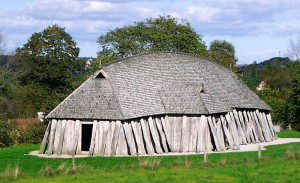
In a previous article on frith, I raised the topic of community. I’d like to expand on that and how it relates to modern day heathens. We live in an exceptionally mobile world in which we form personal and social ties in a multitude of ways. Does this mean that our communities are expanded, or are these extended relations just an addition to our social outlets, external to true community?
From my perspective, community is formed by those who are closest to me at home, my family being the central point of focus. It is for these people that I put in time and energy, with whom I work according to our shared values, ideals, and understandings. It is their welfare and well-being that I am dedicated to. These individuals are my innangarð. Providing for their needs, establishing rules and disciplines, teaching my children, and continuously building on those communal concepts are directly tied to the continued prosperity of my home and the people who live under its roof. Real community comes with direct personal responsibility and accountability, whether the members are family or an extension of it.
In the worldview of the elder heathens, the foundation of community was a tribal platform comprised of families and individuals who worked together to preserve and support their own livelihood. Additionally, they had established community rules and social structure. Anyone living outside of the community was distinguished as separate and apart — dwelling outside of the boundary of shared responsibility. This distinction made clear what individuals were accountable for and what they were not. What lay outside of their community was considered wild, perhaps even dangerous, and it was viewed with careful consideration. While tribes were known to have communicated with one another and shown a certain courtesy, it was done so in keeping with the best interest of the tribe. Elder heathens’ highest priority was their families, and then the individuals who made up their community.
Modern heathens attempt to reconstruct the ways of the ancient Germanic tribes as accurately as possible. This can be accomplished through doing research on how the ancient Germanic worldview and practices were implemented and then applying those concepts. The religion of the ancient heathens was native to their understandings and practices. Though we no longer live in that time period, we still have similar reponsibilities. If we can apply their worldview and perspective on community, we may better understand their reasoning and develop our own practices to be in line with theirs.
Networking and social connections are often made today via online media outlets, and we can utilize these tools to further our social circles. They can be valuable places of research and learning, or places to share experiences. However, it is becoming common to hear the term “heathen community” applied to strangers in various online groups, meetups, and open discussion boards. Terms like “brother” and “sister” are randomly dropped onto individuals who are little more than strangers.
Personally, when I am engaging in group dialogue, I do not see a “heathen community” but rather individuals who may be similarly invested in learning about heathenry. This means that some heathens I encounter online or in a pub moot might share my ideals, and some may not. While these people can provide an excellent social outlet, I do not have a responsibility for them any more than they have a responsibility for me.
Referring to a stranger as “brother” or “sister,” or using “our heathen community” to imply that someone I do not personally know is accountable for me, devalues the meaning of these words. Using such terms in such broad ways also makes assumptions that may not be true. For instance, if I said, “in the heathen community we all do the following,” and continue with a statement based only on my personal experience, then I have hefted my assumption onto others unfairly, and quite likely inaccurately.
We spend a great deal of time working at jobs, meeting extracurricular demands, and otherwise participating in tasks outside of the community of people that we are responsible for. It’s a busy world, and there hardly ever seems to be enough time to keep up with it all! Whether we are attempting to keep our lives in line with the worldview of ancient heathens or simply trying to maintain our household responsibilities, it’s vital to ensure that we are available for preserving our homes and caring for our immediate family. That time is an investment. This is where community lies – with these people. Those who work with us to establish and help build our real community is where I believe our time is best spent.
It is easy to spend a good deal of time finding and maintaining social connections online. Online communication can be a wonderful way to meet new people and discover new things. However, I do not believe that this should be a substitute for developing and nurturing our real world community, especially if our goal is to emulate how the ancient heathens would have lived.
Heathen Woman is published on alternate Fridays. Subscribe via RSS or e-mail!

















